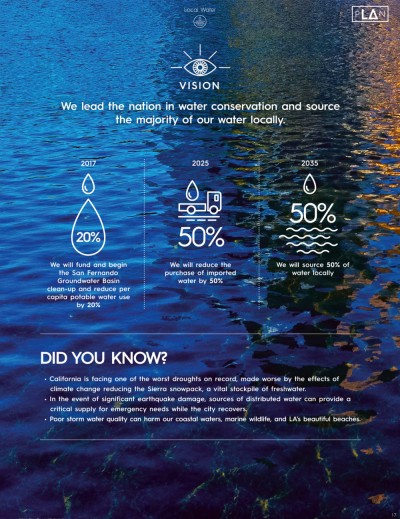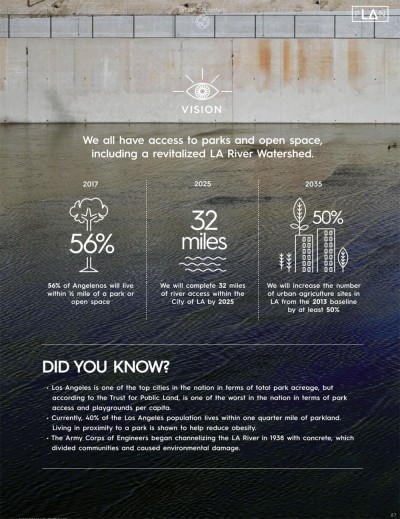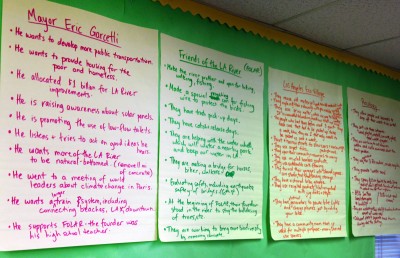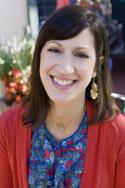Talking Sustainability with Mayor Garcetti
Jessie: Thanks so much for taking the time to meet with us today. Where are you today, and what is going on around you?
Mayor Garcetti: I am now in my office at city hall. Today was a typical day. The beginning of the day, I had a press conference with Google. We announced that Google is going to bring Google Fiber to Los Angeles, which means that you can download an entire high-definition movie in about thirty-six seconds.
Then I got briefed on the security situation. After what we saw, the tragedy of what happened in San Bernardino, I’ve been getting briefed by our police department to make sure our city is safe and that we have police officers where we need them to be.
Jessie: We were hoping that you would talk a little bit about your process for making decisions. We know you work with advisors and members of your staff. What’s the process that you go through to make a decision?
Mayor Garcetti: I think the most important thing I’ve learned as mayor is not learning how to speak like I am with you right now, but learning how to listen. It’s important to be able to speak well, whether you go into politics, business, education. I think your teachers will tell you the most important thing is to be a good listener—I learned this because I used to be a teacher in the classroom—and how to be a good mayor is to learn how to listen, how to hear people around you. It’s not always the student that puts her hand up first who always has the most thoughts.
Sometimes it’s okay not to put your hand up first and to listen to the first four or five people talking, and then you put your hand up and say, “Now that I’ve thought about this issue, listened to everybody, here’s my opinion.” That’s what I try to do when I make decisions.
Jessie: Do you feel like there are communities in Los Angeles that are not as represented as a voice within the larger community? If so, how do you seek out and listen to those communities?
Mayor Garcetti: Of course. We’re a very prosperous city if you average out our prosperity and our wealth and our opportunities, but you can’t average things out if somebody lives in a neighborhood where the crime is still too high or there’s too much poverty, or there’s not enough housing, or everybody’s homeless. Who cares that our city is wealthy? It doesn’t change life for them. There are many groups that are not as empowered as they should be.
For instance: girls and women. What did I do? We have three-hundred people who help oversee our city departments. They’re called commissioners. They’re in charge of the airport or the police department or the Department of Water and Power. Half of the commissioners for the first time are women. We made sure that they come from places like South L.A. or the northeast San Fernando Valley, or the east side of our city, areas that people might not have schools that are as good. I’ve put a real focus on those people who have been forgotten.
There’s a whole group of people who have served time in our jails and prisons. They’ve already served their sentences, they want to return to society, but it’s very difficult for them to get jobs. I created an office of reentry to help them get jobs. The same thing with our veterans; they’ve often been overlooked. I have a program to hire ten-thousand veterans in the city of Los Angeles. Just one year into it, we’ve hired more than five-thousand veterans. I’m always asking, “Who’s missing,” whether it’s people of color, whether it’s youth, whether it’s seniors, whether it’s LGBT members. We do work with the transgender community, for instance, and the trans community to ensure that people have jobs and don’t face discrimination. We’re always looking for who’s missing, and it’s not just who’s in the room, it’s who’s not in the room.
Jessie: That’s something that we’ve worked on with students as well, even in a conversation about a book, we’re always looking for who is not participating and who has not been invited in. How would you describe the overall health of our city, and what information do you rely on to answer that question? What kind of advisors do you have in the area of environment and on our urban ecosystem?
Mayor Garcetti: I just came back from Paris. What’s going in Paris, students?
Students: Was it the climate change?
Mayor Garcetti: Yes, the main reason I was there was because all of the presidents and prime ministers of the world, as well as many mayors like myself—we had over 420 mayors there—are coming together to deal with the environment. Because of climate change, we know that you guys are growing up with a historic drought. How many of you guys are working on saving the drought? You are my secret weapons. Turn those faucets off. Get rid of that grass. Plant some other plants. Look at your toilet and get the low-flush toilet. We’ll help you pay for it. Turn off the sprinkler when it’s raining, all that good stuff. We’re experiencing that because of global warming and climate change.
I would say the environmental health of the city is much, much better. When I grew up, I couldn’t play outside some days in the San Fernando Valley, where I grew up in Encino, because of the smog that we experienced. You see that now in China and other places where people can’t breathe. We’ve cleaned up places like the Port of Los Angeles, where all those big ships come in that bring you toys for Christmas and Hanukkah, and all the goods that our nation imports from other places. That used to be very dirty polluting. We’ve cleaned up as much as 97% of some of the pollutants there.


We’ve got a lot of work to do, but if you want to read about it, we put out our first sustainable city plan, which is called P-L-A-N, and the L-A is highlighted because we live in L.A. You can look at all the different things you can do, whether it’s the air we breathe, the water we drink, the green space we play in, the trash we throw out, our sewer system—we can all do big things to make this an even greener city.
Jessie: What are the causes you’ve been most passionate about? What projects have come to your attention in the time that you’ve been mayor?
Mayor Garcetti: A lot of things—one thing I was very passionate about coming in was to try to build a new public transportation system to help us reduce our traffic and so that some of you might not care about getting in a car by the time you’re teenagers. We’re building five new rail lines; you’ll be able to take a rail car from Downtown Los Angeles all the way to the beach in Santa Monica for the first time in fifty or sixty years, a new Crenshaw line that goes down to South L.A., and we’ll eventually bring a people mover, a rail line into LAX, so you can go to the airport without having to take a car.
Second, I’ve always cared a lot about the L.A. River, and so we have a big plan to continue to revitalize the Los Angeles River, which is only a short walk from your school. We’re looking at a bike path that would go all the way through the San Fernando Valley up to Chinatown and maybe down to Long Beach along the river. We’re looking at tearing up some of the concrete, so we could actually put grass and some plants on the banks of the river like it once was.
One project that’s come to me since I’ve been mayor is that I want to bring the Olympics back to L.A. Who wants the Olympics to come to L.A.?
Students: We do!
Mayor Garcetti: I want to bring the Olympics back for you. There are four cities competing for the Olympics: Paris, Los Angeles, Rome, and Budapest. I think we’ve got a really good shot at holding the Olympics in 2024. The vote is going to be in a little bit less than two years from now, September 2017. Maybe you guys can help us win the Olympics by getting young people together and doing projects or cool art things that show how much we love the Olympics in L.A.
Jessie: Why are you excited about having the Olympics in Los Angeles? What would that mean for our city, or why you think it’s a good thing for us to have?
Mayor Garcetti: I think that great cities solve their greatest challenges like homelessness and traffic, but great cities also reach for amazing opportunities. The Olympics can be very expensive, but here in Los Angeles, we should be able to make money off of it and create jobs. Most of the facilities are already built, we already have the Rose Bowl, we already have the Coliseum, we already have basketball arenas like Staples Center and The Forum, and tennis courts, and all the things we need.
Plus, bringing the world to Los Angeles shows how global we are. It can also show the world what great sports we have here in Los Angeles. We can add sports like skateboarding and surfing. We can play beach volleyball, which is an Olympic sport, right on the beach in Santa Monica where it was invented. We have more athletes that train here in Southern California than in any city in the world. We’re a natural sports town. I think we can put on a really fun Games here. This is the home of Universal Studies and Disneyland. This is the home of the Oscars. This is the home of tech companies like Snapchat and others. We know how to communicate with people all the time. Quite frankly, that’s what the Olympics needs right now.

Jessie: Are you okay if we open it up for questions from the students?
Mayor Garcetti: Of course.
Lila: What made you want to become a mayor?
Mayor Garcetti: I wanted to make a difference. I was a council member for twelve years, and I represented Hollywood and Silver Lake and Echo Park, and I saw the power to transform people’s lives, to help people get jobs and housing, to build new parks. I love Los Angeles. I’m a native-born Los Angeles resident, fourth generation. Three years ago when I had the opportunity to run, there were good people who were running, but I thought I could maybe bring some enthusiasm and some ideas, and a really good team of people. I decided to run, not knowing if I’d win, but in life you’ve got to take risks to get rewards. I was lucky enough that the people chose me.
Ben: What is your favorite part about being a mayor?
Mayor Garcetti: My favorite part about being mayor is probably getting to meet everybody in this city. I might meet somebody who’s a famous movie star, and then the next meeting I have is with somebody who’s homeless and living in their car, and everything in between. I love all of that. I love that I can connect communities that have never seen each other. I love being the connecter for people, with each other and with their city. I think that’s the best part of being mayor, and just seeing this city get better and better all the time. It’s going to be a really good decade that you guys are growing up in.
Lola: Have we ever had a female mayor?
Mayor Garcetti: We have not had a female mayor, and it’s long overdue. In fact, there’s only one female member of the city council, out of fifteen. I care very deeply about this. I’m a proud feminist. I’m somebody who, as I said, made half the city commissioners women because I’m hoping some of them will run for council and mayor in the future. When I started on the city council, we had six women; now we have one, so I hope some of you girls there will consider running for office.
Dylan: What was your favorite impact you’ve had on our city while being mayor?
Mayor Garcetti: I think I’m probably proudest that we housed fifty-five hundred formerly homeless veterans in the last year and a half. These are people who served in the Army, in the Navy, in the Air Force and Marines who were living on our streets or in their cars. I promised to end veterans’ homelessness in Los Angeles. We’ve housed over fifty-five hundred, and we have about seventeen hundred left. Knowing that I’ve had an impact on the people’s lives is what I’m happiest about.
My advice for you is don’t plan too far ahead in life. You never know what’s around the corner. If you plan something too far in advance, it might not come true. Always follow your heart and ask yourself what’s right at that moment.
Juliana: Do you ever get frustrated being the mayor?
Mayor Garcetti: Sure. I’m happy more than frustrated, but there are always frustrations. I’m surprised by how easy some of the big things are. For forty years, we talked about bringing public transportation to the airport, and it’s never happened. In my first year, we passed the plan to make it happen. Same thing with the L.A. River we’ve talked about for decades, and we’re going to move forward with more than a billion dollars to revitalize the river. Other days, you’re trying to do the simplest thing, like just hire somebody, and they tell you it’s going to take a year to get something done.
It’s always been done this way. There are frustrating days, and sometimes people yell at you. Sometimes you have protesters. Sometimes you have people who disagree with you. If you want to be mayor, you have to be ready for people who love you and people who hate you. That’s tough. You can’t take the compliments too seriously, though you should always listen to them. You can’t take the insults too seriously. You have to know that it’s not important what you’re doing today. What’s important is what you leave behind tomorrow.
Zev: What is your biggest concern about L.A.?
Mayor Garcetti: I think my biggest concern about L.A. is that we have a big divide in our city, economically. We have a lot of people who work for minimum wage, over a million people in our city who live in poverty who are working or their family members are working. We have schools where the dropout rate is 50%. Our public education system isn’t good enough. I think Los Angeles will always bring really interesting people, and some of them will grow up here to run movie studios and start new companies, and help electric cars get built and shoot rockets into space. I want people who grow up in Los Angeles, no matter what their zip code is, to have that same opportunity. That’s, I think for me, the most pressing problem we have.
Angie: What’s the hardest challenge you’ve faced being mayor?
Mayor Garcetti: I think the hardest challenge I’ve faced as mayor is how do you bring together a region of eighteen million people when you’re mayor of just the city of four million in the middle, and get them all to participate together and recognize one city? Does anybody here live in Santa Monica? West Hollywood? Beverly Hills? Glendale? Burbank? Those are different cities in the city of Los Angeles, but it doesn’t feel like a different city because it’s just one big mass. I think the biggest challenge is how do we get people to care across those borders? Traffic doesn’t stop at the city border. Air pollution doesn’t stop at a city border. Our economy is all over the city border. My biggest challenge is making sure that we all care about each other and that we think of ourselves as one region.
Ava: When you were younger, did you always want to become mayor?
Mayor Garcetti: No, I thought I would be a musician or an actor, or maybe do something in human rights around the world. I didn’t really think about running for mayor until about a year before I declared. I didn’t think about running for city council until a year before I decided to run. My advice for you is don’t plan too far ahead in life. You never know what’s around the corner. If you plan something too far in advance, it might not come true. Always follow your heart and ask yourself what’s right at that moment.


